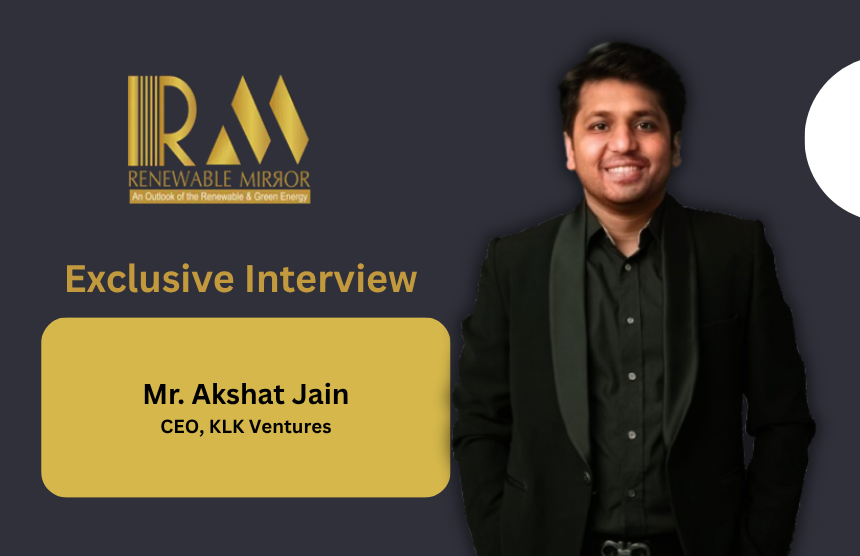1. What inspired KLK Ventures to focus on green energy and solar investments, and how do you see this sector shaping India’s energy future?
KLK Ventures’ journey into green energy was driven by both foresight and purpose. Coming from a legacy in heavy industrial manufacturing as K.L. Khanna Gears Industries, we saw early on the growing need for sustainable solutions to address India’s energy and environmental challenges. The transition into solar and clean energy was a natural evolution that aligned with our commitment to innovation, national energy security, and sustainable development. Today, India’s solar sector stands at the cusp of exponential growth, propelled by supportive policies, falling costs, and increasing demand for clean energy. We believe solar energy will be at the heart of India’s future energy mix, and KLK is proud to play a leading role in this transformation.
2. How is KLK Ventures contributing to advancing solar technology or sustainable infrastructure in India?
At KLK Ventures, we are advancing solar technology through continuous investment in manufacturing, R&D, and deployment. Our state-of-the-art facility produces high-efficiency solar PV modules, lithium-based battery packs, and integrated solar products like streetlights and water pumps. We are ALMM approved, enabling us to supply government-backed projects across India. Furthermore, our solar installations, ranging from large rooftop plants to decentralized solar systems are helping build sustainable infrastructure across rural and urban India. We also prioritize quality through rigorous in-house testing, ensuring that our products are built to last in India’s diverse climatic conditions.
3. What challenges do you see in scaling renewable energy projects in India, and how is KLK Ventures addressing them?
Scaling renewable energy in India presents several challenges, land acquisition, financing, evolving regulatory frameworks, and the need for advanced storage solutions. At KLK, we approach these challenges with a blend of technical agility and strategic foresight. Our financial expertise allows us to structure sustainable and competitive bids, while our modular and scalable products help us adapt to diverse project needs. We actively engage with policy developments and optimize our processes to ensure compliance with emerging standards like ALMM. Importantly, our investments in lithium battery technology and local manufacturing enable us to address the intermittency and reliability issues commonly faced in renewable projects.
4. How do government policies and private partnerships influence your strategy in the solar and clean energy space?
Government policies are central to our strategy. Schemes like PM KUSUM, UPNEDA, and BREDA offer both opportunity and direction. We closely monitor policy updates and proactively align our offerings to meet compliance and eligibility criteria. Our deep understanding of tender processes and public-private partnership models allows us to compete effectively and deliver impactful results. At the same time, partnerships with local vendors, technology providers, and financial institutions help us scale faster and more efficiently. These collaborations enable us to extend our reach, share knowledge, and create an ecosystem that supports long-term sustainability.
5. What are KLK Ventures’ upcoming initiatives or investment plans in solar and other renewable energy segments over the next few years?
Our roadmap for the next few years is ambitious yet focused. We are scaling up our solar module and battery manufacturing capacities to meet growing demand. Expansion of our Bihar facility is a strategic move to serve underserved markets with high-quality solar products. We are also exploring smart solar homes, hybrid systems, and advanced battery storage technologies like LiFePo4 to make renewable energy more reliable and accessible. Participation in future government tenders under programs like PM KUSUM and UPNEDA remains a priority. Ultimately, our goal is to become a one-stop solution for solar energy products and services, both in India and in select international markets.
6. How is KLK Ventures integrating energy storage, hybrid systems, or smart grid technologies with its solar projects to enhance reliability and flexibility?
Energy storage and smart grid integration are critical to the next phase of renewable energy. At KLK, we are actively incorporating lithium-based storage solutions, especially LiFePo4 batteries, into our solar projects to address intermittency and enhance reliability. Our products are designed for hybrid systems that can combine solar with other energy sources for optimal performance. We are also exploring IoT-enabled monitoring systems to create smart, responsive solar installations. These technologies not only improve efficiency but also empower users with data-driven energy management, making clean energy more resilient and user-friendly.
7. What role does community engagement, local partnerships, or skill development play in KLK Ventures’ execution of solar projects, especially in rural or underserved areas?
Community engagement is at the core of our project execution strategy. In rural and underserved regions, we don’t just install systems, we empower people. Whether it’s training local youth in solar installation, educating farmers on solar irrigation under PM KUSUM, or working with village councils to identify energy needs, our projects are built in partnership with the communities they serve. We also collaborate with local MSMEs for installation and maintenance, ensuring economic benefits stay within the region. Through awareness campaigns and hands-on engagement, we aim to build not just infrastructure, but trust and ownership among local populations.
